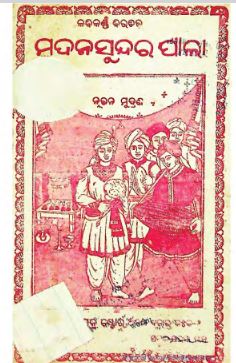The literary heritage of Odisha is rich and varied, replete with profound works of poetry that have enthralled readers for centuries. Amongst this treasure trove of Odia literature stands the mesmerizing work, “Madanasundar Pala,” authored by the celebrated poet Kabikarna. This piece of literary brilliance not only captivates with its lyrical beauty but also delves deep into the heart of human emotions, moral dilemmas, and mythological grandeur.
The “Pala” tradition in Odia literature and performing arts is an illustrious and esteemed facet of Odisha’s cultural fabric. Originating as a narrative form of storytelling, Pala combines lyrical poetry, music, and drama to convey moral lessons, mythological tales, and historical events. Kabikarna’s “Madanasundar Pala” is a sterling example of this tradition, where the narrative is deeply entwined with the ethos of Odia culture.
Two of the most poignant and complex characters in “Madanasundar Pala” are Gandhari and Kunti, both of whom hold monumental positions in the broader canvas of the Mahabharata. Kabikarna’s depiction of these characters is nuanced and deeply empathetic, offering readers a fresh perspective on their inner worlds and the choices they make in the face of overwhelming adversity.
Gandhari, the wife of Dhritarashtra and the mother of the Kauravas, is presented in “Madanasundar Pala” as the epitome of stoic endurance. Despite her blindfolded existence, a symbol of her loyalty to her visually impaired husband, Gandhari’s vision is sharp and her wisdom profound. Kabikarna intricately paints her inner turmoil and silent suffering, making her a symbol of restrained strength and maternal angst. Her restrained sorrow and unwavering determination to uphold dharma, even at the cost of her own progeny, resonate deeply with the readers.
On the other hand, Kunti, the mother of the Pandavas, is depicted with equal reverence and complexity by Kabikarna. Her life is punctuated by sacrifices, secret sorrows, and unwavering devotion to her sons and principles. “Madanasundar Pala” explores her multifaceted personality—the dutiful queen, the protective mother, and the woman burdened with secrets. Kunti’s internal conflicts, especially surrounding Karna’s identity and her moral obligations, are rendered with a sensitivity that highlights Kabikarna’s mastery in character portrayal.
Kabikarna’s “Madanasundar Pala” is not merely a poetic rendition but a timeless piece that intertwines the philosophical and moral fabric of the Mahabharata with the rich narrative tradition of Pala. Through the evocative journeys of Gandhari and Kunti, the poet delves into themes of duty, sacrifice, and the indomitable human spirit.
For the enthusiasts of Odia literature and lovers of poetic storytelling, “Madanasundar Pala” stands as a beacon of literary brilliance, drawing readers into a world where history, mythology, and human emotion converse in the most melodious of tongues. It is a testament to Kabikarna’s poetic genius and a priceless jewel in the crown of Odia literary tradition.
The literary heritage of Odisha is rich and varied, replete with profound works of poetry that have enthralled readers for centuries. Amongst this treasure trove of Odia literature stands the mesmerizing work, “Madanasundar Pala,” authored by the celebrated poet Kabikarna. This piece of literary brilliance not only captivates with its lyrical beauty but also delves deep into the heart of human emotions, moral dilemmas, and mythological grandeur.
The “Pala” tradition in Odia literature and performing arts is an illustrious and esteemed facet of Odisha’s cultural fabric. Originating as a narrative form of storytelling, Pala combines lyrical poetry, music, and drama to convey moral lessons, mythological tales, and historical events. Kabikarna’s “Madanasundar Pala” is a sterling example of this tradition, where the narrative is deeply entwined with the ethos of Odia culture.
Two of the most poignant and complex characters in “Madanasundar Pala” are Gandhari and Kunti, both of whom hold monumental positions in the broader canvas of the Mahabharata. Kabikarna’s depiction of these characters is nuanced and deeply empathetic, offering readers a fresh perspective on their inner worlds and the choices they make in the face of overwhelming adversity.
Gandhari, the wife of Dhritarashtra and the mother of the Kauravas, is presented in “Madanasundar Pala” as the epitome of stoic endurance. Despite her blindfolded existence, a symbol of her loyalty to her visually impaired husband, Gandhari’s vision is sharp and her wisdom profound. Kabikarna intricately paints her inner turmoil and silent suffering, making her a symbol of restrained strength and maternal angst. Her restrained sorrow and unwavering determination to uphold dharma, even at the cost of her own progeny, resonate deeply with the readers.
On the other hand, Kunti, the mother of the Pandavas, is depicted with equal reverence and complexity by Kabikarna. Her life is punctuated by sacrifices, secret sorrows, and unwavering devotion to her sons and principles. “Madanasundar Pala” explores her multifaceted personality—the dutiful queen, the protective mother, and the woman burdened with secrets. Kunti’s internal conflicts, especially surrounding Karna’s identity and her moral obligations, are rendered with a sensitivity that highlights Kabikarna’s mastery in character portrayal.
Kabikarna’s “Madanasundar Pala” is not merely a poetic rendition but a timeless piece that intertwines the philosophical and moral fabric of the Mahabharata with the rich narrative tradition of Pala. Through the evocative journeys of Gandhari and Kunti, the poet delves into themes of duty, sacrifice, and the indomitable human spirit.
For the enthusiasts of Odia literature and lovers of poetic storytelling, “Madanasundar Pala” stands as a beacon of literary brilliance, drawing readers into a world where history, mythology, and human emotion converse in the most melodious of tongues. It is a testament to Kabikarna’s poetic genius and a priceless jewel in the crown of Odia literary tradition.
Books Info
| Books name | Madanasundar Pala |
| Editor | Kabikarna |
| No Of pages | 30 |
| Publisher | Dharmagrantha Store |
| Publication | nd |
| Printed At | NA |
| Distributor | NA |

